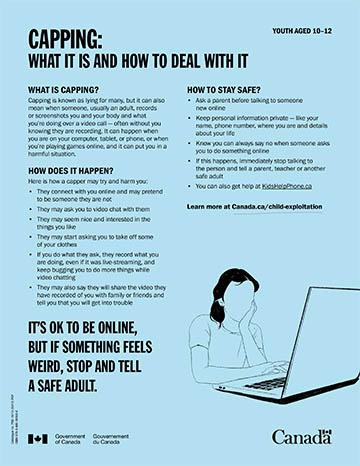Fact Sheet - For youth aged 10-12 - Capping
Youth aged 10–12
Capping: What it is and how to deal with it
What is Capping?
Capping is known as lying for many, but it can also mean when someone, usually an adult, records or screenshots you and your body and what you’re doing over a video call — often without you knowing they are recording. It can happen when you are on your computer, tablet, or phone, or when you’re playing games online, and it can put you in a harmful situation.
How does it happen?
Here is how a capper may try and harm you:
- They connect with you online and may pretend to be someone they are not
- They may ask you to video chat with them
- They may seem nice and interested in the things you like
- They may start asking you to take off some of your clothes
- If you do what they ask, they record what you are doing, even if it was live-streaming, and keep bugging you to do more things while video chatting
- They may also say they will share the video they have recorded of you with family or friends and tell you that you will get into trouble
How to stay safe?
- Ask a parent before talking to someone new online
- Keep personal information private — like your name, phone number, where you are and details about your life
- Know you can always say no when someone asks you to do something online
- If this happens, immediately stop talking to the person and tell a parent, teacher or another safe adult
- You can also get help at KidsHelpPhone.ca
It’s OK to be online, but if something feels weird, stop and tell a safe adult.
Learn more at Canada.ca/childexploitation
